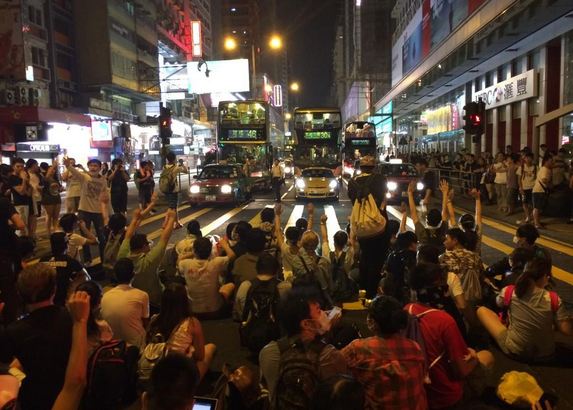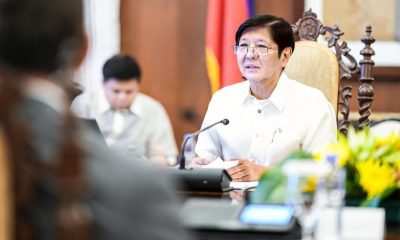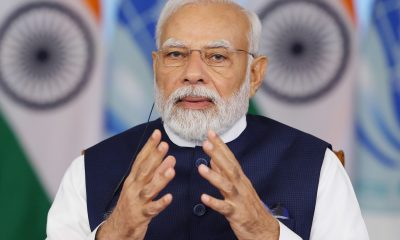Breaking
Hong Kong protests fade; students vow to carry on

“Mong Kok protesters sitting down blocking Nathan Road, a hugely busy Kowloon thoroughfare. Quite a sight #HongKong” (Photo courtesy of Katy Lee on Twitter)
HONG KONG — The students whose calls for democratic reforms sparked the most dramatic challenge to authorities since Hong Kong returned to Chinese control are vowing to keep up the fight.
But as the numbers of protesters dwindled Monday from tens of thousands into the hundreds, it was unclear where the tumult of the past week would lead.
Schools reopened and civil servants returned to work after protesters cleared the area outside the city government headquarters, a focal point of the demonstrations that began Sept. 26. Crowds also thinned markedly at the two other protest sites, and traffic flowed again through many roads that had been blocked.
In the Mong Kok district, the site of weekend clashes in which mobs tried to drive the demonstrators out of the intersection they were blocking, hundreds of curious onlookers surrounded the remaining protesters Monday evening, taking pictures.
“The threats in Mong Kok have passed, and now people are just curious about the sit-in,” said 36-year-old Anita Lee, a resident. “That’s why there are more onlookers than protesters.”
Many in Hong Kong are wondering if the protest movement may have run its course and whether the students have a clear strategy for pressing their demand that all candidates for the city’s top leader, or chief executive, not be screened by a pro-Beijing committee.
“They can’t sustain attendance in protests if it goes on and on,” said Michael Davis, a professor at Hong Kong University. “They need some strategy where they can withdraw the crowds so they can say to the government that if they are not sincere, they will mobilize crowds back on the streets.”
Disagreements were evident after the students and the government began preliminary talks.
Lau Kong-wah, the undersecretary of constitutional affairs, said late Monday that the government and students had agreed on terms for the talks, including that the two sides would be on an equal footing.
Lester Shum, a leader of the Hong Kong Federation of Students, confirmed the agreement, but said they had not discussed or reached a consensus on the agenda.
Chief Executive Leung Chun-ying, who has rejected the protesters’ calls for him to resign, said in a TV address Monday that the government would seek “a sincere dialogue on political reform.”
At the same time, Leung reiterated that everyone should go home and stop blocking the streets.
“There are lots of teenagers and students with passion who love Hong Kong in various assemblies. However, some of them are aggressive and use violence. No matter what your attitude is toward Occupy Central, the police will firmly take enforcement action to those who use violence,” he said.
The students say they would walk away from the talks if police, who fired tear gas and pepper spray on unarmed protesters Sept. 28, use force to clear away the remaining demonstrators. The police violence and attacks by mobs drew huge crowds in a massive show of support.
“It’s up to the government now. This is the first step, but the pressure has to continue,” said Alex Chow, one of the student leaders.
The leeway for negotiations appears limited since Leung and Chinese officials have said Beijing will stick to its decision to screen all candidates for top leader, which many in Hong Kong say amounts to reneging on its promise of universal suffrage.
One option would be to convince the government that having open nominations for chief executive is not as big a threat as the potential for further protests.
In that sense, “I think they can already declare victory in this round 1 of their movement,” Davis said. “There’s a contest for the hearts and minds of Hong Kong people going on, and protesters have clearly won round 1. They have the public support and sympathy.”
While they might be weak in coordination and strategy, the protesters’ youthfulness and the movement’s lack of central leadership have added to their appeal. Lawmakers and pro-democracy politicians have played almost no role in the movement, which began as Occupy Central – a campaign founded last year by law professor Benny Tai. But Tai and other Occupy leaders have let several student and grass-roots political groups lead the protests.
One faction, Scholarism, is led by 17-year-old Joshua Wong and draws many younger students, while the Federation of Students represents mostly university students. Still other protesters say they follow no particular group or leader.
Differences and confusion within the movement became clear Sunday, when several leaders announced a retreat from key sites, while others declared there was no withdrawal or urged protesters to regroup in one main area.
Still, the protesters share a common agenda.
“There is still a remarkably consistent demand for genuine democracy,” said Alvin Y.H. Cheung, a visiting scholar at the U.S.-Asia Law Institute. “There is a striking unity of purpose.”
The young activists also have shown an impressive knack for coordination and planning. Although the sit-ins formed spontaneously, they were disciplined and doggedly nonviolent. The youths camped out in the middle of city streets, organized ample supply lines and kept the “occupation” areas as litter-free and orderly as possible.
By Monday, many of the remaining protesters in Hong Kong’s Admiralty district and across Victoria Harbor in Mong Kok were undeterred by their dwindling numbers but admitted they could not afford to neglect work and school much longer.
But 18-year-old Louis Chan said he was not sure achieving free elections – the students’ original goal – is likely.
“I did think it was possible, but now I don’t think so because they (the Hong Kong government) didn’t give any response and China is also very much against this,” he said.
Associated Press writers Elaine Kurtenbach and Wendy Tang contributed to this report.





















